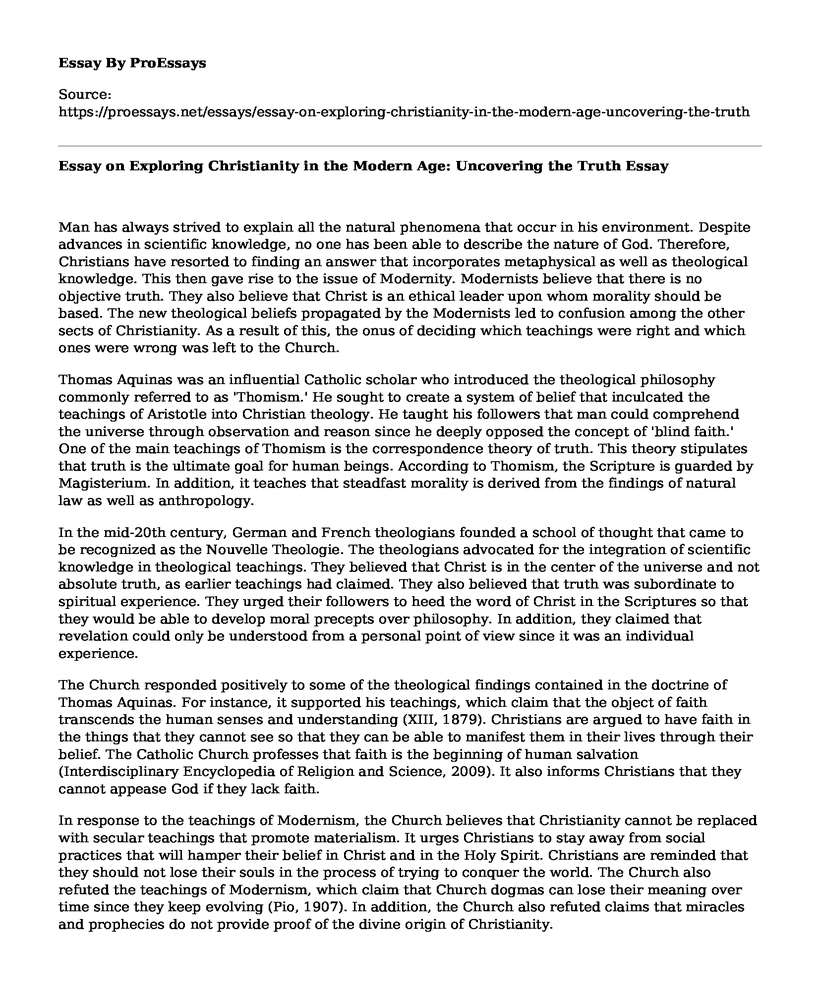Man has always strived to explain all the natural phenomena that occur in his environment. Despite advances in scientific knowledge, no one has been able to describe the nature of God. Therefore, Christians have resorted to finding an answer that incorporates metaphysical as well as theological knowledge. This then gave rise to the issue of Modernity. Modernists believe that there is no objective truth. They also believe that Christ is an ethical leader upon whom morality should be based. The new theological beliefs propagated by the Modernists led to confusion among the other sects of Christianity. As a result of this, the onus of deciding which teachings were right and which ones were wrong was left to the Church.
Thomas Aquinas was an influential Catholic scholar who introduced the theological philosophy commonly referred to as 'Thomism.' He sought to create a system of belief that inculcated the teachings of Aristotle into Christian theology. He taught his followers that man could comprehend the universe through observation and reason since he deeply opposed the concept of 'blind faith.' One of the main teachings of Thomism is the correspondence theory of truth. This theory stipulates that truth is the ultimate goal for human beings. According to Thomism, the Scripture is guarded by Magisterium. In addition, it teaches that steadfast morality is derived from the findings of natural law as well as anthropology.
In the mid-20th century, German and French theologians founded a school of thought that came to be recognized as the Nouvelle Theologie. The theologians advocated for the integration of scientific knowledge in theological teachings. They believed that Christ is in the center of the universe and not absolute truth, as earlier teachings had claimed. They also believed that truth was subordinate to spiritual experience. They urged their followers to heed the word of Christ in the Scriptures so that they would be able to develop moral precepts over philosophy. In addition, they claimed that revelation could only be understood from a personal point of view since it was an individual experience.
The Church responded positively to some of the theological findings contained in the doctrine of Thomas Aquinas. For instance, it supported his teachings, which claim that the object of faith transcends the human senses and understanding (XIII, 1879). Christians are argued to have faith in the things that they cannot see so that they can be able to manifest them in their lives through their belief. The Catholic Church professes that faith is the beginning of human salvation (Interdisciplinary Encyclopedia of Religion and Science, 2009). It also informs Christians that they cannot appease God if they lack faith.
In response to the teachings of Modernism, the Church believes that Christianity cannot be replaced with secular teachings that promote materialism. It urges Christians to stay away from social practices that will hamper their belief in Christ and in the Holy Spirit. Christians are reminded that they should not lose their souls in the process of trying to conquer the world. The Church also refuted the teachings of Modernism, which claim that Church dogmas can lose their meaning over time since they keep evolving (Pio, 1907). In addition, the Church also refuted claims that miracles and prophecies do not provide proof of the divine origin of Christianity.
Conclusion
In conclusion, it is evident that over the years, the belief of Christians was subject to change as a result of the increase in scientific knowledge around them. As Christians became more knowledgable in science, they began questioning some of the religious teachings. Such endeavors gave rise to the concepts of Modernism, Thomism as well as the Nouvelle Theologie.
References
Interdisciplinary Encyclopedia of Religion and Science. (2009). Dogmatic Constitution 'Del Filius'. Retrieved from http://inters.org/Vatican-Council-I-Dei-Filius. Accessed on 7th October 2019.
Pio, X. (1907). Pascendi Dominici gregis. Acta Sanctae Sedis, 40. Retrieved from http://w2.vatican.va/content/pius-x/en/encyclicals/documents/hf_p-x_enc_19070908_pascendi-dominici-gregis.html Accessed on 7th October 2019.
XIII, L. (1879). Aeterni Patris. The Papal Encyclicals, 17-27. Retrieved from http://w2.vatican.va/content/leo-xiii/en/encyclicals/documents/hf_l-xiii_enc_04081879_aeterni-patris.html Accessed on 7th October 2019.
Cite this page
Essay on Exploring Christianity in the Modern Age: Uncovering the Truth. (2023, Feb 23). Retrieved from https://proessays.net/essays/essay-on-exploring-christianity-in-the-modern-age-uncovering-the-truth
If you are the original author of this essay and no longer wish to have it published on the ProEssays website, please click below to request its removal:
- Philosophers Position on God Existence Report
- Stephen Hawking and God Essay
- Case Study: End of Life Decisions
- Dalai Lama View on Practice of Universal Compassion Essay
- Annotated Bibliography on Confucius on Upright Leadership and Best Way to Rule
- Research Paper on Hinduism: Ancient Religion, Spiritual Beliefs, and Contemporary Practices
- Be a Christian: All Religions Contain Some Truth - Essay Sample







